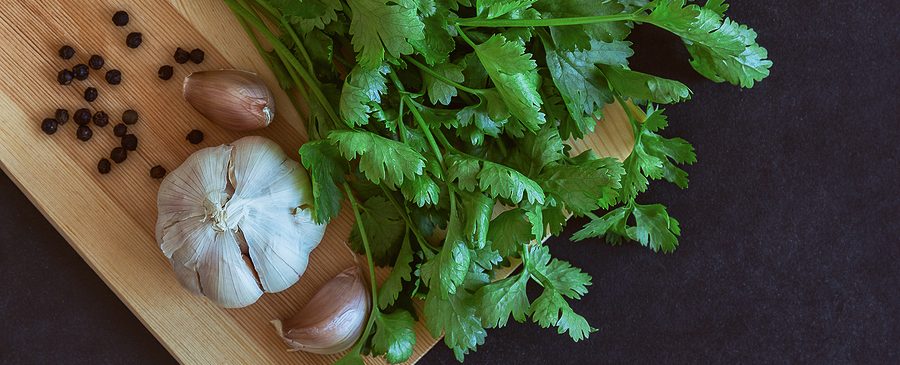What Is Coriander?
Coriander has been used as a digestive aid for thousands of years, with evidence of its use dating as far back as 5,000 B.C. It’s mentioned in Sanskrit texts, ancient Egyptian papyri, the Old Testament and the writings of the Greek physician Hippocrates. The Roman armies brought it to Europe, where it was used to preserve meats, and the Chinese believed it counteracted food poisoning.
Coriander grows wild over a wide area of Western Asia and Southern Europe, and archaeological findings point toward cultivation by ancient Egyptians. It also appears to have been cultivated in Greece since at least the second millennium B.C. In 1670, it was first brought to the British colonies of North America and was one of the first spices cultivated by early settlers.
Coriander, also known as cilantro, Chinese parsley or dhania, is a herb in the family Apiaceae. Scientifically known as Coriandrum sativum, the plant is native to the regions of southern Europe, North Africa, and southwestern Asia. The plant is packed with essential oils, acids, minerals, and vitamins.
Coriander grows wild over a wide area of Western Asia and Southern Europe, and archaeological findings point toward cultivation by ancient Egyptians. It also appears to have been cultivated in Greece since at least the second millennium B.C. In 1670, it was first brought to the British colonies of North America and was one of the first spices cultivated by early settlers.
Here are the 7 health benefits of coriander.
1. Coriander may help you manage your high blood pressure. It has been shown that coriander could positively reduce blood pressure in individuals suffering from hypertension. Constituents from coriander interact with calcium ions and the neurotransmitter acetylcholine, relaxing blood vessel tension.
2. It could help you with anemia. Low iron content in the blood can result in shortness of breath, heart palpitations, extreme fatigue, and a decrease in brain functions. Coriander is high in iron, which can reverse some symptoms of anemia.
3. This herb can help increase bone health. Coriander is a rich source of calcium. Calcium, along with other minerals, can help prevent osteoporosis and protect bone strength and durability.
4. Protects against mouth ulcers. Citronellol, a constituent in coriander, can clean the mouth. This speeds up the healing process of wounds and freshens the breath.
5. It can also help individuals with type 2 diabetes. Coriander shows to increase the secretion of insulin from the pancreas, which then raises the insulin level in the blood. This can help individuals, particularly people with type 2 diabetes, lower the risk of dangerous sugar spikes.
6. Coriander can help prevent and even cure smallpox. Coriander contains essential oils rich in antimicrobial, antioxidant, anti-infectious and detoxifying components and acids can prevent and cure smallpox, as well as have a soothing effect on smallpox patients.
7. Finally, it can help individuals with indigestion. Studies have been shown to decrease the occurrence of dyspepsia, or indigestion when coriander was added into the diet.
Recipe For Health
Ingredients:
- Coriander leaves – 1 cup
- Celery – 1 cupWater – 4 glasses
Directions:
- Take 4 glasses of water in a container.
- Add 1 cup each of coriander leaves and celery to it.
- Boil them for 20 minutes.
- Strain and drink that water.
- Do this daily once to reduce high blood pressure.








 Download Brochure
Download Brochure